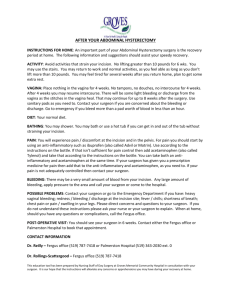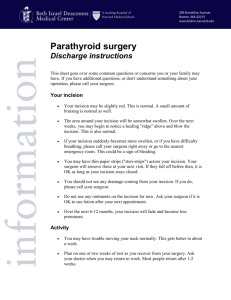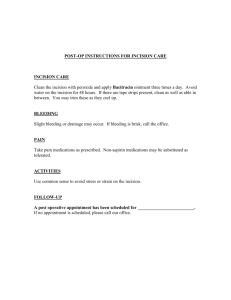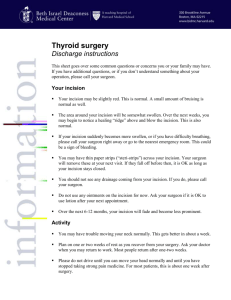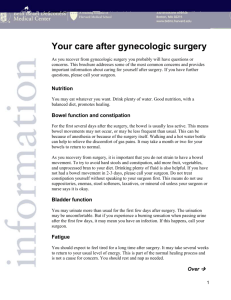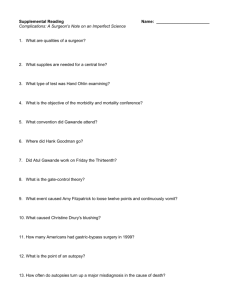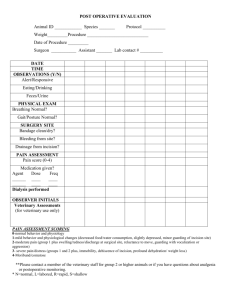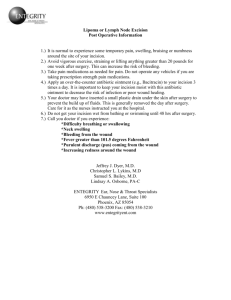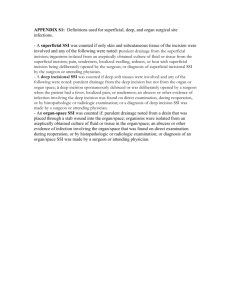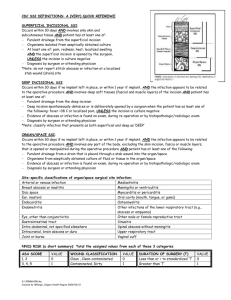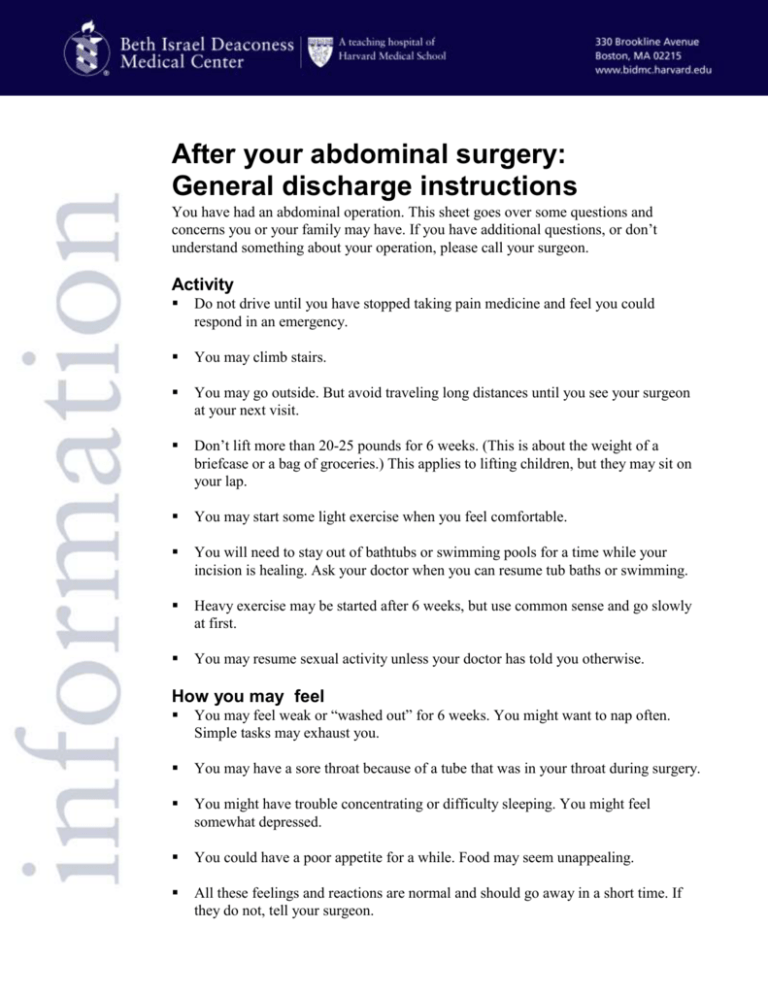
After your abdominal surgery:
General discharge instructions
You have had an abdominal operation. This sheet goes over some questions and
concerns you or your family may have. If you have additional questions, or don’t
understand something about your operation, please call your surgeon.
Activity
Do not drive until you have stopped taking pain medicine and feel you could
respond in an emergency.
You may climb stairs.
You may go outside. But avoid traveling long distances until you see your surgeon
at your next visit.
Don’t lift more than 20-25 pounds for 6 weeks. (This is about the weight of a
briefcase or a bag of groceries.) This applies to lifting children, but they may sit on
your lap.
You may start some light exercise when you feel comfortable.
You will need to stay out of bathtubs or swimming pools for a time while your
incision is healing. Ask your doctor when you can resume tub baths or swimming.
Heavy exercise may be started after 6 weeks, but use common sense and go slowly
at first.
You may resume sexual activity unless your doctor has told you otherwise.
How you may feel
You may feel weak or “washed out” for 6 weeks. You might want to nap often.
Simple tasks may exhaust you.
You may have a sore throat because of a tube that was in your throat during surgery.
You might have trouble concentrating or difficulty sleeping. You might feel
somewhat depressed.
You could have a poor appetite for a while. Food may seem unappealing.
All these feelings and reactions are normal and should go away in a short time. If
they do not, tell your surgeon.
Your incision
Your incision may be slightly red around the stitches or staples. This is normal.
You may gently wash away dried material around your incision.
Do not remove steri-strips for 2 weeks. (These are the thin paper strips that might be
on your incision.) But if they fall off before that, it’s OK.
It is normal to feel a firm ridge along the incision. This will go away.
Avoid direct sun exposure to the incision area.
Do not use any ointments on the incision unless you were told otherwise.
You may see a small amount of clear or light red fluid staining your dressing or
clothes. If the staining is severe, please call your surgeon.
You may shower. As noted above, ask your doctor when you may resume tub baths
or swimming.
Over the next 6-12 months, your incision will fade and become less prominent.
Your bowels
Constipation is a common side effect of medicine such as Percocet or codeine. If
needed, you may take a stool softener (such as Colace, one capsule) or gentle
laxative (such as Milk of Magnesia, 1 tablespoon) twice a day. You can get both of
these medicines without a prescription.
If you go 48 hours without a bowel movement, or have pain moving the bowels, call
your surgeon.
After some operations, diarrhea can occur. If you get diarrhea, don’t take antidiarrhea medicines. Drink plenty of fluids and see if it goes away. If it does not go
away, or is severe and you feel ill, please call your surgeon.
Pain management
It is normal to feel some discomfort/pain following abdominal surgery. This pain is
often described as “soreness.”
Your pain should get better day by day. If you find the pain is getting worse instead
of better, please contact your surgeon.
You will receive a prescription from your surgeon for pain medicine to take by
mouth. It is important you take this medicine as directed. Do not take it more
frequently than prescribed. Do not take more medicine at one time than prescribed.
Your pain medicine will work better if you take it before your pain gets too severe.
Talk with your surgeon about how long you will need to take prescription pain
medicine. Please don’t take any other pain medicine, including non-prescription
pain medicine, unless your surgeon has said it is OK.
If you are experiencing no pain, it is OK to skip a dose of pain medicine.
To reduce pain, remember to exhale with any exertion or when you change
positions.
Remember to use your “cough pillow” for splinting when you cough or when you
are doing your deep breathing exercises.
If you experience any of the following, please contact your surgeon:
sharp pain or any severe pain that lasts several hours
pain that is getting worse over time
pain accompanied by fever of more than 101
a drastic change in nature or quality of your pain
Medications
Take all the medicines you were on before the operation just as you did before,
unless you have been told differently.
In some cases, you will have a prescription for antibiotics or other medication.
If you have any questions about what medicine to take or not to take, please call
your surgeon.
Danger signs
Please call your surgeon if you develop:
Worsening abdominal pain
Sharp or severe pain that lasts several hours
Temperature of 101 degrees or higher
Over
Severe diarrhea
My doctor:
Vomiting
Name: _________________________
Redness around the incision that
is spreading
Phone number: __________________
Increased swelling around the
incision
Excessive bruising around the incision
Cloudy fluid coming from the wound
Bright red blood or foul smelling discharge coming from the wound
An increase in drainage from the wound
Follow-up care
Please call your surgeon’s office for a follow-up appointment.
My appointment: _____________________________________________________
This material was prepared by clinicians from the departments of surgery and nursing at Beth Israel Deaconess Medical Center. It is
produced and distributed by The Beth Israel Deaconess Learning Center. ©2003, Beth Israel Deaconess Medical Center. All rights
reserved.
MC0145 REV 6/03

